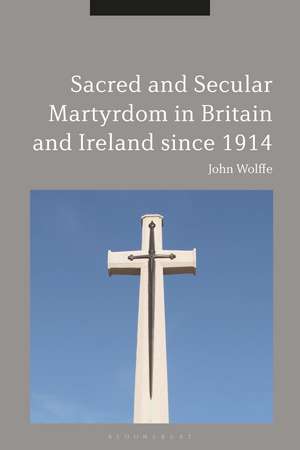Sacred and Secular Martyrdom in Britain and Ireland since 1914
Autor John Wolffeen Limba Engleză Hardback – 27 noi 2019
Preț: 655.67 lei
Preț vechi: 942.64 lei
-30% Nou
Puncte Express: 984
Preț estimativ în valută:
125.47€ • 130.20$ • 104.88£
125.47€ • 130.20$ • 104.88£
Carte tipărită la comandă
Livrare economică 17-31 martie
Preluare comenzi: 021 569.72.76
Specificații
ISBN-13: 9781350019270
ISBN-10: 1350019275
Pagini: 208
Dimensiuni: 156 x 234 mm
Greutate: 0.45 kg
Editura: Bloomsbury Publishing
Colecția Bloomsbury Academic
Locul publicării:London, United Kingdom
ISBN-10: 1350019275
Pagini: 208
Dimensiuni: 156 x 234 mm
Greutate: 0.45 kg
Editura: Bloomsbury Publishing
Colecția Bloomsbury Academic
Locul publicării:London, United Kingdom
Caracteristici
Provides historical and comparative context for understanding present-day suicide attacks
Notă biografică
John Wolffe is Professor of Religious History at the Open University, UK, and recently (2013-15) held an RCUK Global Uncertainties Leadership Fellowship which supported the research for this book. He is the author of numerous books and articles on modern North Atlantic religious history, especially evangelicalism, religion and nationalism and responses to death.
Cuprins
Preface1. Varieties of Martyrdom2. The Cross of Sacrifice: Commemorating the Dead of the First World War3. Faiths of their Fathers and their Children: Varieties of Martyrdom in Inter-War Britain4. From Easter to Good Friday: Martyrs for Ireland5. Christian Martyrdom and War Remembrance: From the Second World War to the Falklands6. Rejecting and Reinventing Martyrdom: The Sacred and the Secular since the 1980s7. Conclusion: The Legacies of HistoryAppendix: Interviewee Key Characteristics and DatesBibliographyIndex
Recenzii
This is a lucid, engaging and fascinating account of sacred and secular martyrdom in Britain and Ireland since the outbreak of the First World War. Drawing on a wide range of original material, Wolffe sheds fresh light on the contested and malleable nature of Martyrdom. This timely book raises significant questions about how martyrs are created, remembered and debated over
Compelling and well-written, this book traces the fading away of a very old idea - that that those who die for a cause are martyrs. Tracing the fragmentation of British society since the 1960s and the turn away from civil war in Ireland North and South from the 1980s, Wolffe has produced a powerful study of the evolution of the sacred in political language over the last century. There is no book like it in the field of social and cultural history.
A worthwhile addition to the historiography of memorialization in Britain.
In each chapter, Wolffe skilfully guides the reader through the complex engagement between Church (mainly Church of England) and Government over how to interpret, remember, and commemorate the fallen in war. ... [T]his is a valuable study on an important and controversial topic.
This is a rich and immensely enjoyable book, one that will widely appeal to audiences in the UK. Its accessible style means that it will be used by undergraduates and postgraduates alike, who will find much to inspire them in its pages. Wolffe set himself a difficult task in writing this monograph but one which he achieved in producing a significant and thought-provoking book.
This is a sensitive discussion and in its excavation of the place of religious themes in a national culture it has much in common with Wolffe's fine, earlier work . [Sacred and Secular Martyrdom in Britain and Ireland since 1914] remains the work of a conspicuously sensitive, observant historian who has helped us to recognize something that the accumulating judgments of more conventionally minded historians might well have preferred to ignore.
Compelling and well-written, this book traces the fading away of a very old idea - that that those who die for a cause are martyrs. Tracing the fragmentation of British society since the 1960s and the turn away from civil war in Ireland North and South from the 1980s, Wolffe has produced a powerful study of the evolution of the sacred in political language over the last century. There is no book like it in the field of social and cultural history.
A worthwhile addition to the historiography of memorialization in Britain.
In each chapter, Wolffe skilfully guides the reader through the complex engagement between Church (mainly Church of England) and Government over how to interpret, remember, and commemorate the fallen in war. ... [T]his is a valuable study on an important and controversial topic.
This is a rich and immensely enjoyable book, one that will widely appeal to audiences in the UK. Its accessible style means that it will be used by undergraduates and postgraduates alike, who will find much to inspire them in its pages. Wolffe set himself a difficult task in writing this monograph but one which he achieved in producing a significant and thought-provoking book.
This is a sensitive discussion and in its excavation of the place of religious themes in a national culture it has much in common with Wolffe's fine, earlier work . [Sacred and Secular Martyrdom in Britain and Ireland since 1914] remains the work of a conspicuously sensitive, observant historian who has helped us to recognize something that the accumulating judgments of more conventionally minded historians might well have preferred to ignore.
